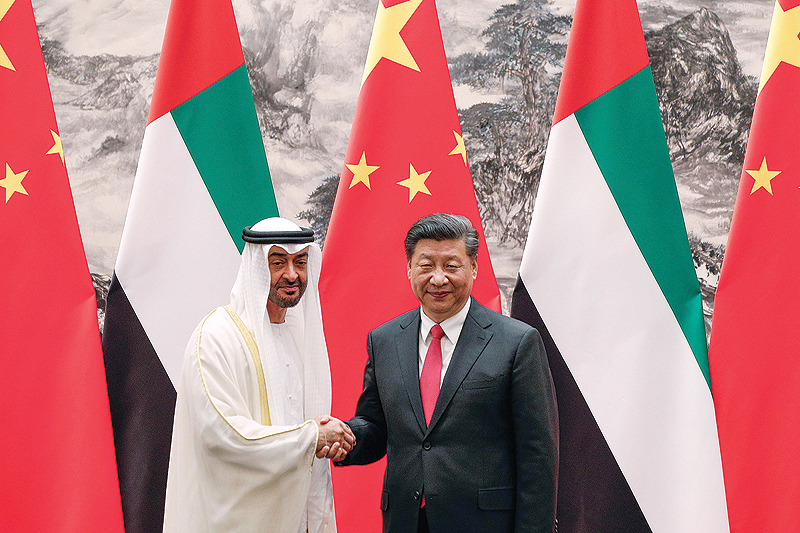BEIJING: China yesterday thanked the United Arab Emirates for backing its security crackdown in Xinjiang, state media said, as President Xi Jinping played host to Abu Dhabi’s crown prince. Beijing has come under growing international scrutiny for placing an estimated one million mostly Muslim ethnic minorities in internment camps in the name of counter-terrorism, but Muslim countries have largely refrained from criticising China.
During his meeting with Crown Prince Mohammed bin Zayed Al-Nahyan in Beijing, Xi thanked the UAE for its “valuable support” on Xinjiang and urged the two countries to strengthen cooperation on anti-terrorism, said state-broadcaster CCTV. In return, Abu Dhabi’s crown prince said the UAE “highly appreciates China’s efforts to protect the rights and interests of ethnic minorities”, according to CCTV’s readout.
He also said the UAE would be willing to “jointly strike against terrorist extremist forces” with China, including the East Turkestan Islamic Movement, a militant group Beijing has accused of attempting to foment Uighur separatism. The crown prince’s remarks come as Beijing seeks to corral more international support for its controversial policies in the country’s northwest region. After initially denying the existence of re-education camps, China has been on a public relations blitz to counter the global outcry against what Beijing calls “vocational education centres”.
So far, Beijing has scored multiple successes, with UN ambassadors from 37 countries - including majority Muslim nations Saudi Arabia and Algeria - releasing a letter earlier this month in defense of China’s treatment of Uighurs and other ethnic minorities in Xinjiang. The letter came after 21 Western nations and Japan co-signed a text denouncing China’s conduct in Xinjiang.
Currently, Turkey is one of the only Muslim-majority countries to have criticized China over its network of camps in the region. In February, Turkey’s foreign ministry lambasted China’s treatment of Uighurs as “a great embarrassment for humanity” and said those in the centres and prisons were “subjected to torture and political brainwashing”. Ankara has, however, adopted a softer stance since Turkish President Recep Tayyip Erdogan visited China in July. “I believe we can find a solution to the issue taking into account the sensitivities of both sides,” Erdogan told Turkish journalists in Beijing before flying back to Turkey, according to Hurriyet daily.
Xi and the Abu Dhabi crown prince also discussed trade and China’s Belt and Road Initiative, an ambitious $1 trillion program that includes maritime, rail and road projects in Asia, Africa and Europe. According to CCTV’s readout, Xi said the two countries should aim to reach their goal of $200 billion in bilateral trade by 2030. In 2018, two-way trade between the two countries hit $45.9 billion, according to China’s commerce ministry. Xi also called for the “good development” of the second phase of the Khalifa Port Container Terminal, as well as the China-UAE Industrial Capacity Cooperation Demonstration Zone, a joint Belt and Road project between the two countries. – AFP










